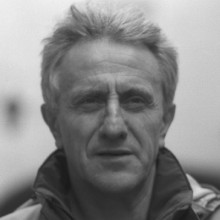Polish literature

Piotr Sommer
Born in 1948, is a poet and translator of contemporary English-language poetry (Frank O'Hara, Charles Reznikoff, John Ashbery, Kenneth Koch, John Berryman, Robert Lowell, Derek Mahon, Seamus Heaney). He has published several dozen books: poetry (his own and translations), literary criticism, anthologies. He also writes poetry for children and is editor of the monthly Literatura na Swiecie.
The protagonist in Piotr Sommer's poems is fascinated by the world's potentiality (“I wonder how the world / joins tomorrow and the following day”), its virtuality and indecipherability (“If the thing is in something else, / do tell me what it is in”). He poses very straightforward questions, and these suddenly reveal themselves to be philosophical or existential; his poems converse with flair, giving his works a healthy dose of rakishness. Sometimes he speaks directly to the reader. Sometimes he allows himself to ramble or gossip. His language is filled with colloquialisms, family stories, and subjective truths – as if a poem were to finally provide a sincere and exhaustive response to an offhand greeting: “What's new?” For example, in “Morning on Earth” the subject first reports on the weather, then smoothly shifts to the people he encounters that morning: “Here's / The electric company guy I like, / And no sign of the gas guy / I can't stand. / And all of a sudden two Misters M. / One I've fallen for, the other / A bit of a hotshot; / Coming back, both nine years old, / Just passing the jasmine bush, […] Behind the door / the dog's excited […].” Sommer's world is made up of parts that illuminate and complement one another, even if for the reader they only signal someone's privacy. Children are forever darting through Sommer's poems, because this is “fatherhood” poetry in the purest sense, and the condition humaine of the narrating subject is expressed through a concern for the welfare of others (of the child who cracked his head on the terrace, of children crying at night), and secondly – the linguistic imagination of the poet remains that of a child fascinated by, for example, what lies on the other side of the Miedzeszyński Embankment. The reality beyond the embankment appears to be an entirely different world for Sommer. It is only children that have this view of the world, as well as those poets who, as adults, have not lost the courage to trip over their tongues, to banter, and to use poetry to say just what's “on their minds.” It is from these serious, yet entirely chance discoveries that Piotr Sommer's poems emerge, filled with childlike astonishment at the nature of language and the possibilities it creates. “For if a man hears himself / then perhaps he exists, […] and later, from the voice, / he even recognizes himself,” the poet states. The stakes in the world he creates are for a subjective form of speech, profoundly idiomatic, full of existential details to ground us in the “I” narrating the poem and the “you” to whom the poem speaks. The poet puts special emphasis on the world of the child and the individual; what is relational and interpersonal, but also accidental and impersonal (and thus what goes on between the lines, and what might only be defined as self-reflexive); finally, he also reminds us to notice what is peripheral. His critics call him “a declared provincial” (it is no coincidence that he once signed his poems “P. Odmiejski” [“P. Nonurban”]); in turn, it is said of his poems that they are full of “details of life in Warsaw's environs” – in Otwock, where Sommer grew up, and Sulejówek, where he lives. Sommer's idiomatic language can make literally anything a part of the private realm – space, time, people, and events. The poet is interested in details; for life, in his opinion, “is increasingly composed of details.” Sommer has assuredly inherited his faith in the poetic strength of the small, the private, and the concrete from the Anglo-Saxon poetry he translates. The gossip in Polish poetry circles is that “even the way that Sommer orders a cup of coffee is an event of sorts in the Polish language”; this is because the poet is remarkably attuned to the melody of words and sentences. His message is: “Read as though you were to listen, / not to understand.”
BIBLIOGRAPHY
- W krześle, Kraków: WL, 1977.
- Pamiątki po nas, Kraków: WL, 1980.
- Przed snem(dla dzieci), Nasza Księgarnia, Warszawa, 1981.
- Kolejny świat, Czytelnik, Warszawa, 1983.
- Czynnik liryczny i inne wiersze (1880-1886), Londyn: Aneks, 1988.
- Smak detalu i inne ogólniki, Lublin: Kresy, 1995.
- Artykuły pochodzenia zagranicznego, Gdańsk: Marabut, 1997.
- Nowe stosunki wyrazów (wiersze z lat siedemdziesiątych i osiemdziesiątych), Wydawnictwo a5, Poznań, 1997.
- Piosenka pasterska, Legnica: Centrum Sztuki - Teatr Dramatyczny, 1999.
- Po stykach, Gdańsk: Słowo/obraz terytoria, 2005.
- O krok od nich, Wrocław: Biuro Literackie, 2006.
- Rano na ziemi, Poznań: Wydawnictwo Wojewódzkiej Biblioteki Publicznej i Centrum Animacji Kultury, 2009
- Dni i noce, Wrocław: Biuro Literackie, 2009
- Wiersze ze słów, Wrocław: Pomona, 2009
TRANSLATIONS
English:
- Things to Translate & Other Poems, Newcastle upon Tyne: Bloodaxe Bokks, 1991.
- Continued [wybrane wiersze], Highgreen: Bloodaxe Books, 2005.
German:
- Ein freier Tag im April, Wien: Ed. Korrespondenzen, 2002.
Romanian:
- Dimineata pe pământ, trans. Constantin Geambaşu, Bistrita: Editura Charmides, 2015
Spanish:
- w antologii: 101 (6 poetas polacos contemporáneos), trans. Mauricio Barrientos, Maciej Ziętara, Santiago de Chile: RiL editores, 2008